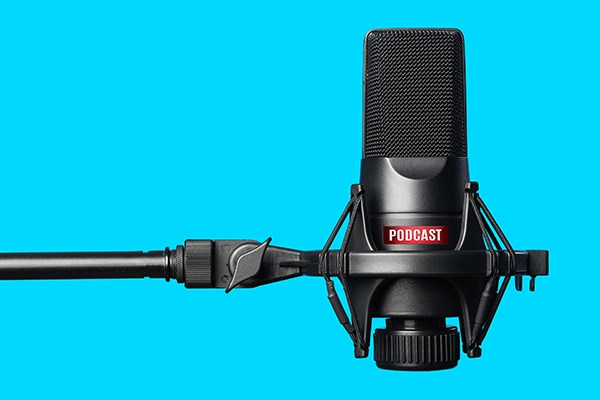The podcasting space is a hot spot in FOAMed. How do you get started if you want to add your voice to the mix? We asked Andy Little, DO, an EMRA•Cast advisor and one of the hosts of EM Over Easy.
With limited time to sit and read, many EM residents tune in to medical podcasts, so what started as hobbyists home-brewing episodes has grown into high-quality content produced by EM podcasters all over the country. Helping to lead the way is Andy Little, DO, who has been podcasting for nearly 3 years as one of the hosts of EM Over Easy. He is also an advisor to EMRA•Cast, helping to train the next round of EM podcasters. We caught up with Dr. Little to understand his podcast process and pick up some lessons for other EM podcasters hoping to take their garage project to a bigger stage.
Stoke Factor
You gotta do it because you love it. The motivation for making a good podcast isn't about numbers or dollars, but about the spirit of sharing the good conversations and the learning that happens when busy, professional, high-achieving friends take the time to sit down and catch up with each other. While it's not a source of massive revenue, the podcast has opened some cool opportunities: This year Dr. Little will travel to Santiago, Chile, and New Delhi, India, as a speaker.
Content
EM Over Easy — with Dr. Little, Tanner Gronowksi, DO, and Drew Kalnow, DO, EMT-P, records 3-4 episodes per month and publishes 1-2 per month, so content is constantly in production. But an idea can take 6 months to develop, yet still not be worth publishing, which can be frustrating.
"Know that you're gonna fail a lot, and accept that," Dr. Little advises. Even the episodes that make it into publication won't all be well-received, but popularity can change over time as listeners go back to previous episodes.
His podcast started as a monthly breakfast club to check in with friends. This evolved into talking about the "nonclinical aspects of EM, the bad news, the angry patients, the crazy shifts."
The podcast is still recorded in the original format at a dinner table. Dr. Little keeps a running list of topics and finds a synergy from material outside of medicine. One recent episode on behavioral expectations was inspired by a sports blog. In another episode recorded during an Ohio ACEP conference, EM Over Easy spoke with physician leaders regarding Ohio's "I'm Sorry" law, affording liability protection when a health care provider tries to express sympathy or condolences in the wake of a bad outcome. That podcast led to a later interview with a state representative and a call to action that could potentially impact future law.
Technical Tips
You don't need to break the bank, but don't spend less than $50 on a mic — garbage in equals garbage out, which will result in more time spent in postproduction. Dr. Little recommends a dynamic mic as opposed to a condenser. The dynamic mic will be more focused than a condenser, which tends to record unwanted extra sounds (from air vents to pops from your lips and tongue). These might not be noticeable when you're recording, but put in a pair of earbuds and these distractions can make an otherwise great episode unlistenable. For gear, he's currently using an Audio Technica 2005 XLR Mic with stand and shock mounts. Other podcast favorites include the Blue Yeti or Snowball Mics. Finally, you can improve your recording with a recorder called the Zoom H5, which allows for multiple tracks. If your computer still has a firewire port, an inexpensive option is finding a used Apogee Duet online.
Post-Production
To edit out the inevitable background noises, control volume, or delete long pauses and loud coughs you'll spend a tremendous amount of your time in postproduction. Initially it took Dr. Little about 5 minutes of editing for every 1 minute of published audio. "You get good at reading audio waves," he said, "just like EKGs."
With experience will come more efficiency, and currently, it takes Dr. Little about 45 minutes to edit a 30-minute episode. For software, most Mac users can start with Garageband because it's easy and free. Other popular options include Audacity or Hindenburg, which allows multiple people to edit the same episode.
Building a Following
You can't just produce content and expect it to be heard. "If you're going to start a podcast, then you need to be all-in for social media," Dr. Little advises. "Twitter, Instagram, Facebook, etc., need to be leveraged to your benefit."
More than half of EM Over Easy's listeners come from these platforms, so if you're not big on social media then you should partner with somebody who is. In addition, don't forget traditional avenues like emailing friends and colleagues, linking to your podcast during presentations, and recording live episodes at conferences to generate unique content and interest.
EMRA is championing the cause of nurturing EM podcasters with the inaugural 5-member class of EMRA podcasting fellows and the rejuvenation of EMRA•Cast. These fellows are completing a yearlong curriculum designed to teach the best methods, from unboxing the microphone to publishing polished dynamic content and getting it heard.
If you want to get started making a podcast, Dr. Little recommends that you "do something you know about, and do something you can."
"EM Over Easy is a subset of my persona and how I view the world as a provider," he said. It's also a reminder to us all of the power and the importance of sitting down around a table and swapping stories with friends on a regular basis.



